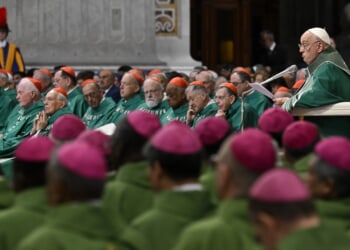Lord Ashcroft KCMG PC is an international businessman, philanthropist, author and pollster. For more information on his work, visit lordashcroft.com
My latest poll finds voters of all parties expecting US tariffs to fall or disappear as President Trump does deals around the world, though with little confidence that Keir Starmer will successfully protect Britain’s interests in the meantime. Uncomfortably for Kemi Badenoch, most Conservative voters expect to make gains in next month’s local elections which in reality are unlikely to materialise.
What have people noticed – and who has noticed what?
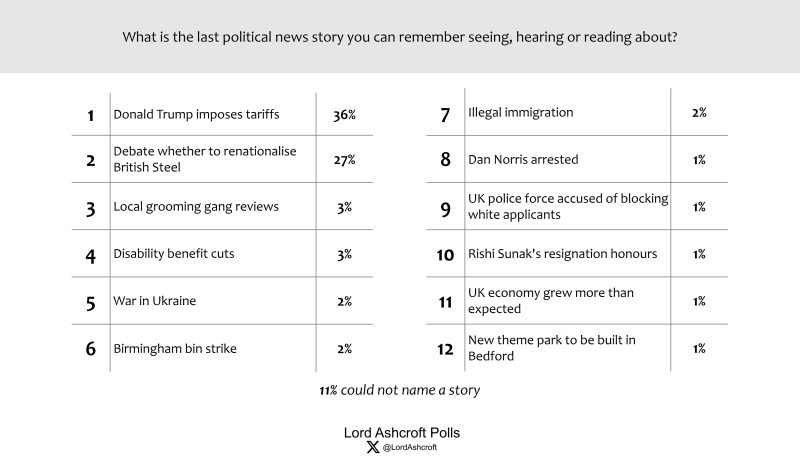
Two stories dominated recollections of political news this month – President Trump’s imposition of tariffs on imports to the US, and the government taking control of British Steel. All other domestic and foreign news was reduced to the low single figures.
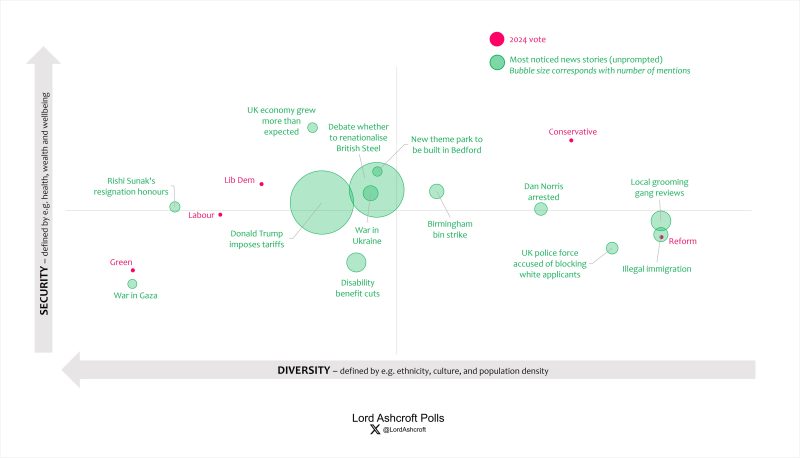
By plotting people’s answers on our political map, we see which kinds of voters have been most likely to mention each story. News about grooming gangs, immigration and accusations of discriminatory recruitment practices in the police were most likely to be mentioned in the Reform-leaning bottom-right quadrant of the map, while stories about British Steel were recalled across the board, hence their fairly central position on the map.
What have Labour done?
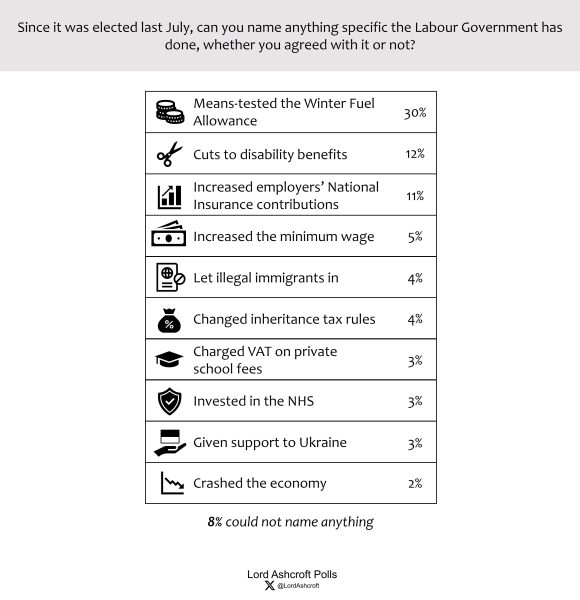
Means-testing the winter fuel allowance continues to top the table when we ask people to recall, unprompted, specific things the Labour government has done since it was elected last July. Cuts to disability benefits has risen to second place, up from fifth in last month’s survey, when it was mentioned by just 5% of respondents.
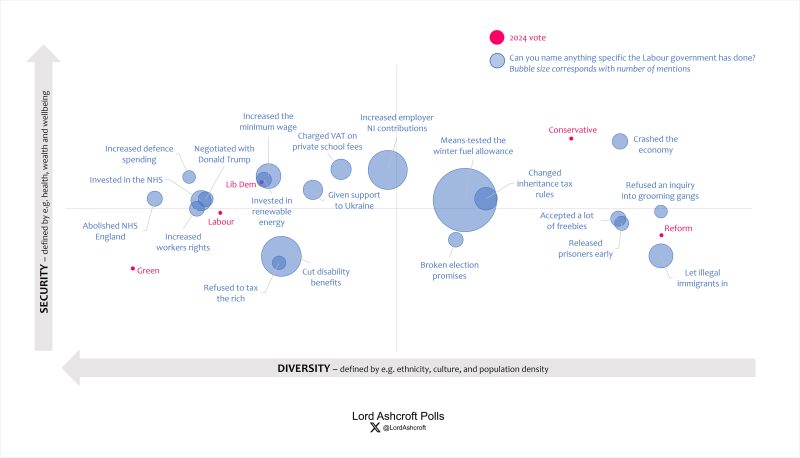
As our political map shows, different parts of the electorate are more likely to recall different actions, decisions or events. Disability benefits cuts were most likely to be mentioned in the less secure, more diverse bottom left, while refusing a national inquiry on grooming gangs and early release of prisoners were most likely to be remembered in the bottom right. The minimum wage, VAT on school fees, renewable energy and international affairs were most likely to have registered in the more secure, more diverse Labour-Lib Dem leaning top left quadrant.
Tariffs and globalisation
End of an era?
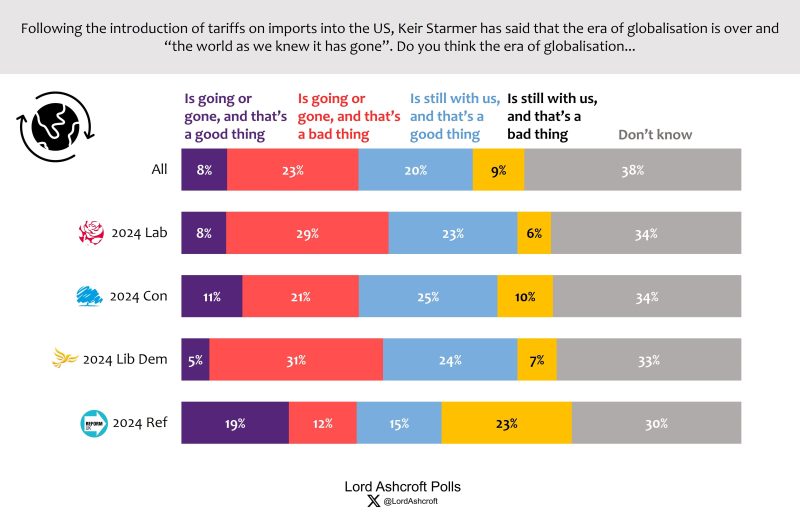
Following Keir Starmer’s statement that “the world as we knew it has gone,” we found voters fairly evenly divided between thinking the era of globalisation was going or gone (31%), or was still with us (29%). Voters as a whole were more likely to have a positive view of globalisation (saying it was going and this was a bad thing, or that it was still with us and this was a good thing) by 43% to 17%. The only exception was 2024 Reform UK voters, 42% of whom said globalisation was going and this was a good thing, or still with us and this was a bad thing; 27% too the opposite views.
What will stay and what will go?
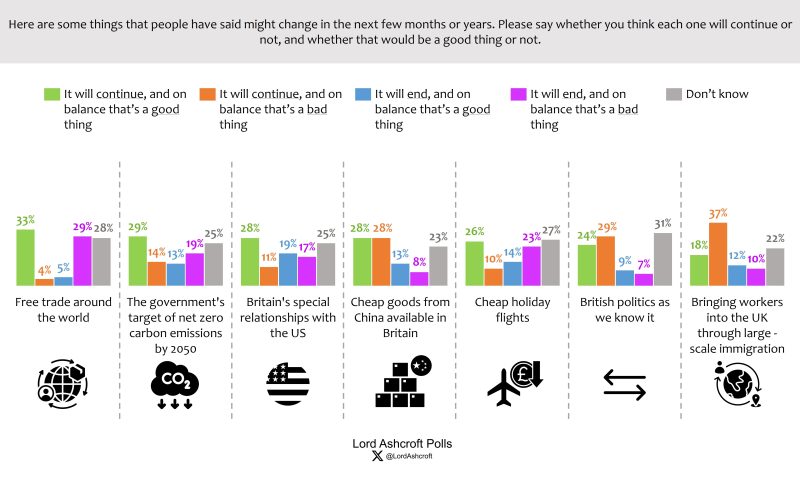
When we asked whether various things would continue or end, and whether this would be a good or a bad thing, we found the three things people thought were most likely to continue (cheap goods from China, large-scale immigration and British politics as we know it) were also the least popular (ie. that it would be bad if they continued or good if they ended).
Opportunities or threats?
Voters as a whole were more likely to see threats than opportunities for the UK in the way the world was changing. A total of 79% saw threats, compared to 43% who saw opportunities (37% saw both). Reform UK voters were the most pessimistic, being the only group in which a majority (55%) saw more threats to the UK than opportunities.
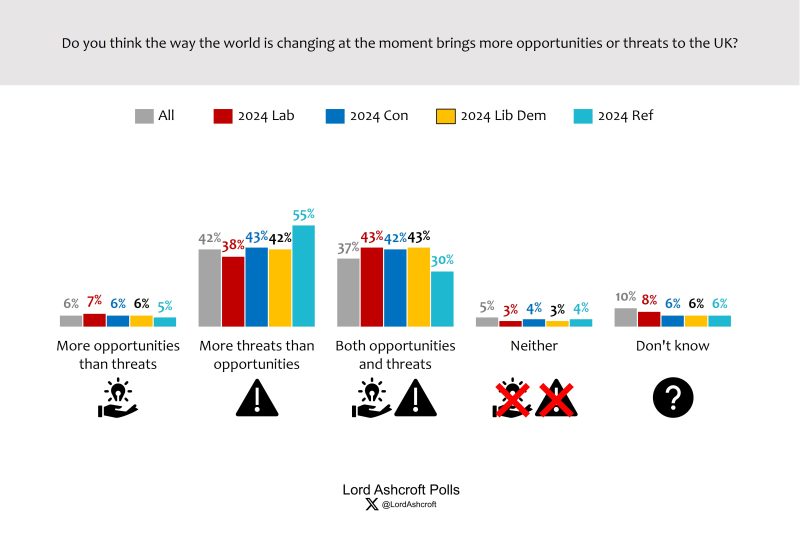
Would we be better off in the EU?
Overall, voters were almost equally likely to say the UK would be in a better position to deal with tariffs and global uncertainty if we were in the EU (30%) and that we are better placed to deal with them outside the EU (30%). A further 22% said EU membership would make no difference one way or the other.
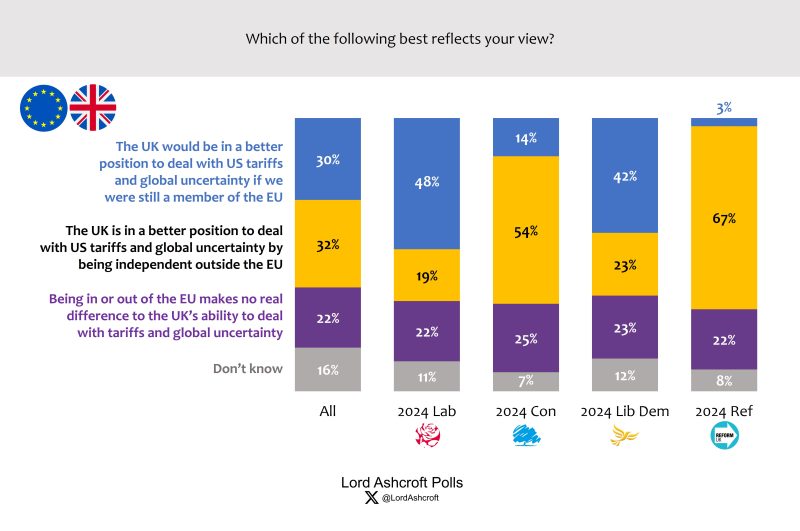
Around half of 2024 Labour (48%), Lib Dem (42%) and Green voters (54%) said Britain would be better placed to deal with tariffs and global uncertainty in the EU. Most Conservatives (54%) and two thirds of Reform UK voters (67%) said we were better placed being independent outside the EU.
Closer relationship with China?
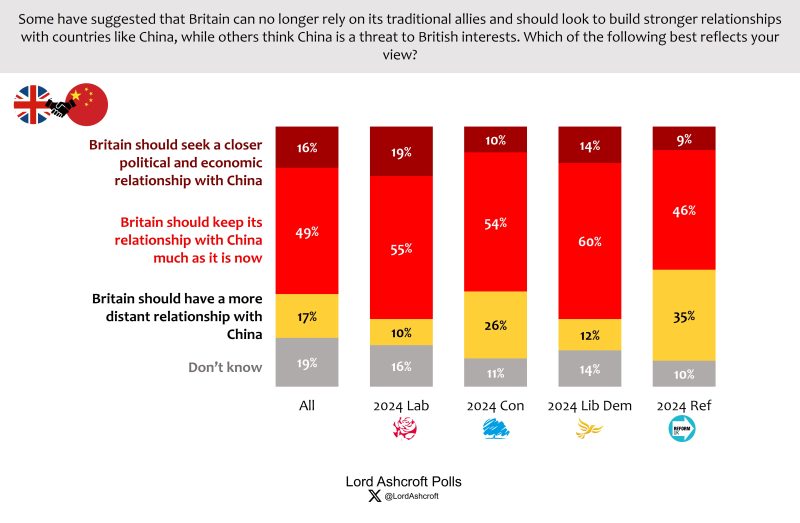
Around half of voters (49%) thought Britain should keep its relationship with China much as it is now, with the remainder divided between wanting to seek a closer relationship (16%) and a more distant one (17%). Labour, Green and SNP voters were more inclined than most to seek a closer relationship, while Conservative and Reform voters were more likely to want a more distant one – though all groups said they would rather maintain the current relationship than either alternative.
Why did we get lower initial tariffs than the EU?
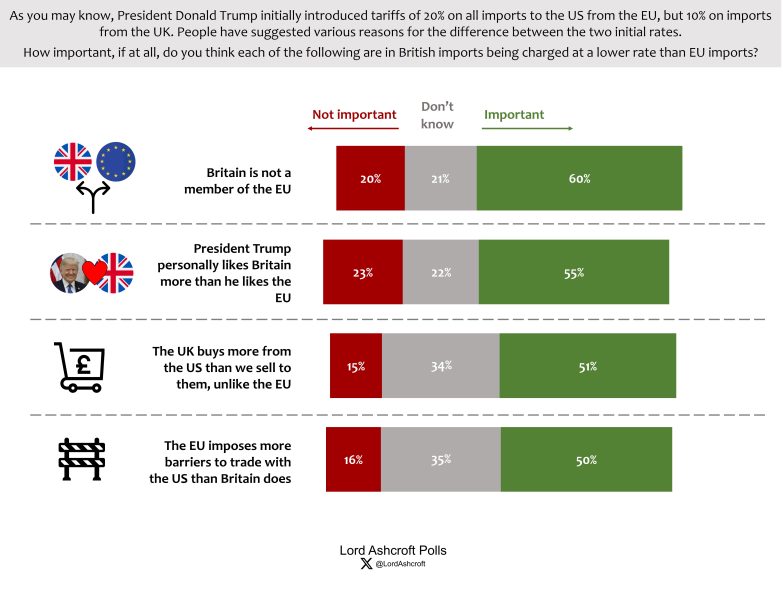
Overall, voters considered Britain’s non-membership of the EU as the most important factor in President Trump’s decision to impose lower tariffs on UK imports than EU imports, followed by the belief that Trump personally likes Britain more than he likes the EU.
Should we impose tariffs on the US?
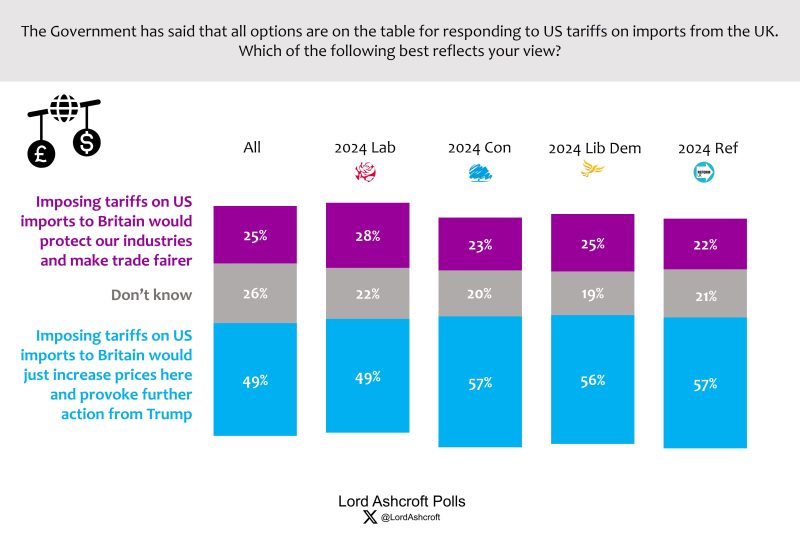
All parties’ voters (except the SNP’s) were more likely to think imposing tariffs on US imports would just increase prices here and provoke further action from President Trump (49% overall) than that doing so would protect our industries and make trade fairer (25%).
Negotiating ploy, or here to stay?
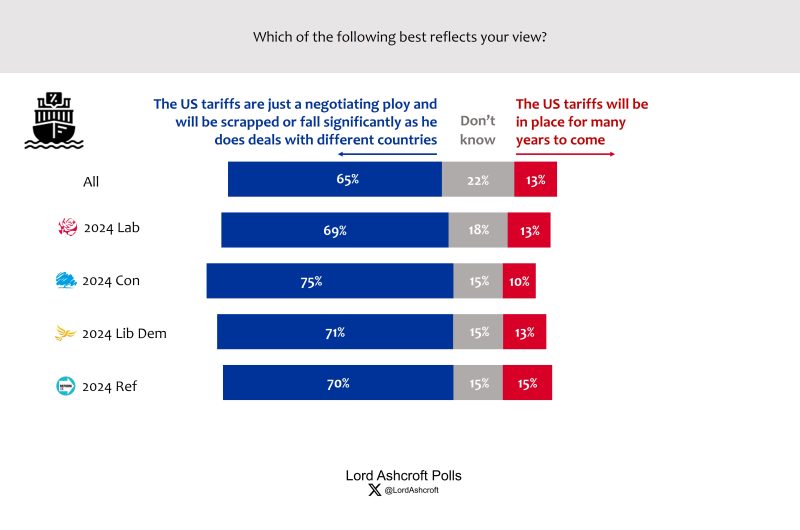 Clear majorities in all voter groups said the thought the tariffs were just a negotiating ploy and would be scrapped or fall significantly as President Trump did deals with different countries around the world. Only 13% thought the tariffs would be in place for many years to come.
Clear majorities in all voter groups said the thought the tariffs were just a negotiating ploy and would be scrapped or fall significantly as President Trump did deals with different countries around the world. Only 13% thought the tariffs would be in place for many years to come.
How much confidence in Keir?
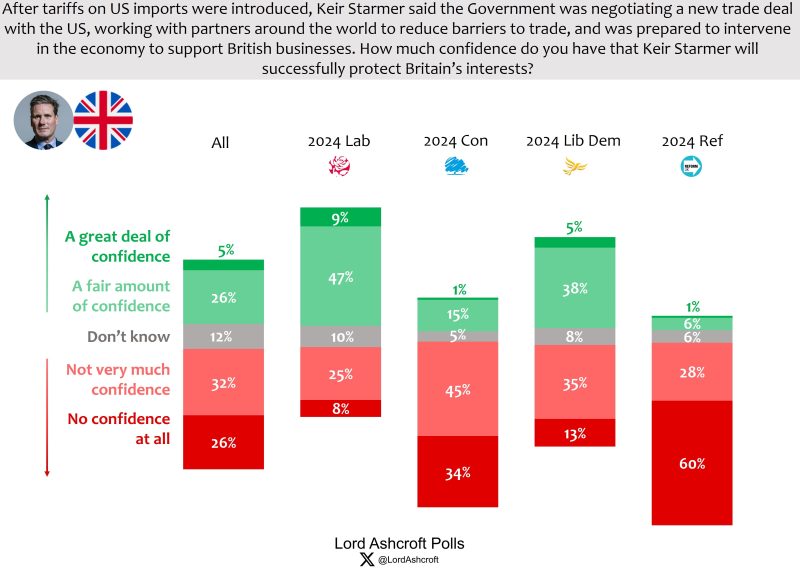
A majority said they had not very much confidence or none at all that Starmer would successfully protect Britain’s interests. Just over 3 in 10 said they had confidence, including just over half (56%) of 2024 Labour voters, but only 1 in 20 (and only 9% of Labour voters) said they had a great deal of confidence.
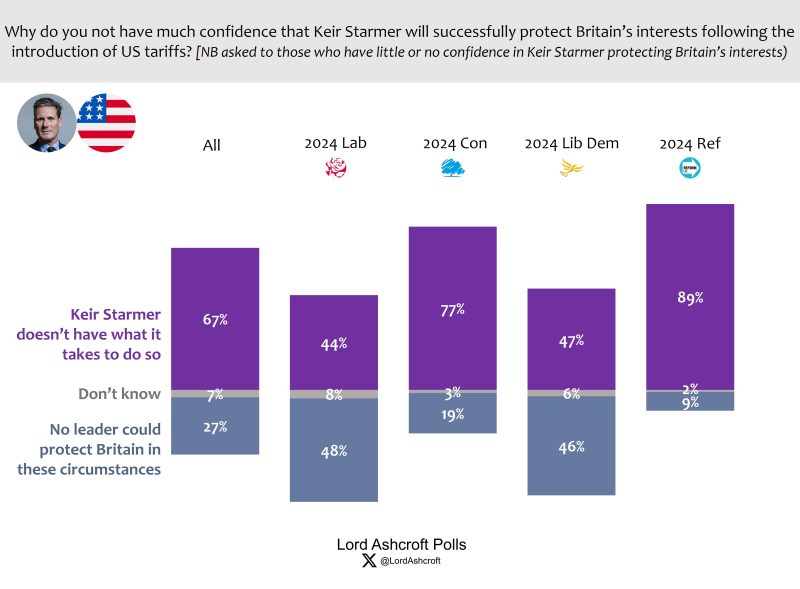
Among those who said they lacked confidence that Starmer would protect Britain’s interests, two thirds (67%) said this was because they did not think he had what it took to do so. Just over a quarter (27%) said it was because no leader could protect Britain in these circumstances. Conservatives and Reform UK voters who lacked confidence leaned heavily towards feeling Starmer does not have what it takes. Labour and Lib Dem voters were divided between this and believing no leader could protect Britain in these circumstances.
The economy and fiscal rules
Labour austerity?
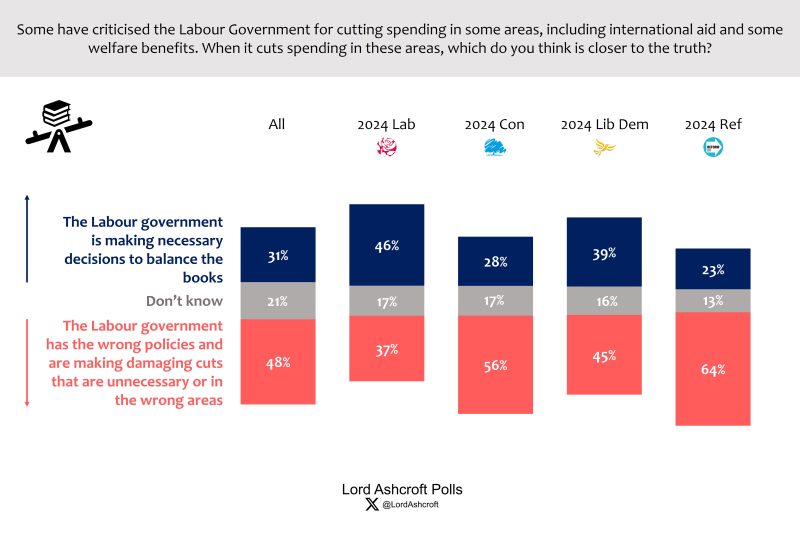
We asked whether, when making cuts in areas like welfare or international development, Labour were making necessary decisions to balance the books or showing they had the wrong policies. Labour voters were the only group more likely to say the government was making necessary decisions to balance the books than that it had the wrong priorities and was making damaging and unnecessary cuts – though 37% of 2024 Labour voters said the latter.
Loosen the fiscal rules?
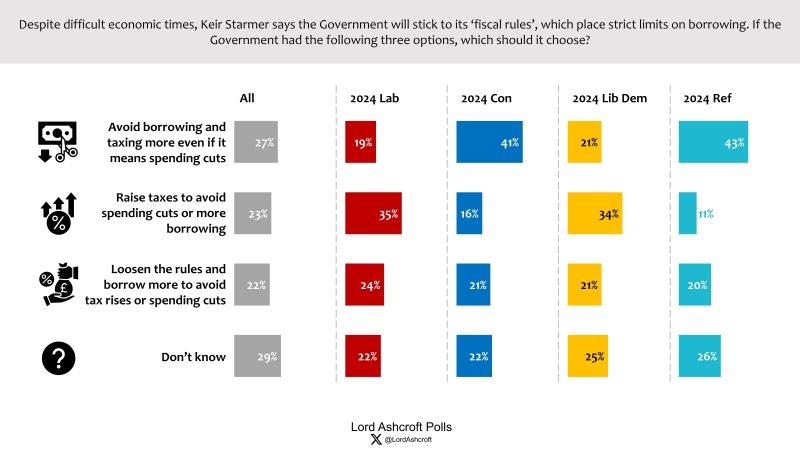
If the government had to choose between the three options, we found that voters overall were fairly evenly divided between spending cuts (27%), raising taxes (23%), or allowing more borrowing (22%), with a further 29% saying they didn’t know. However, there were different views by party support. 2024 Conservatives and Reform UK voters were more likely to want to avoid higher taxes and borrowing even if that meant spending cuts (41% and 43%), while Labour and Lib Dem voters were more likely than most to prefer tax rises to spending cuts or more borrowing (35% and 34%).
Best on the economy?
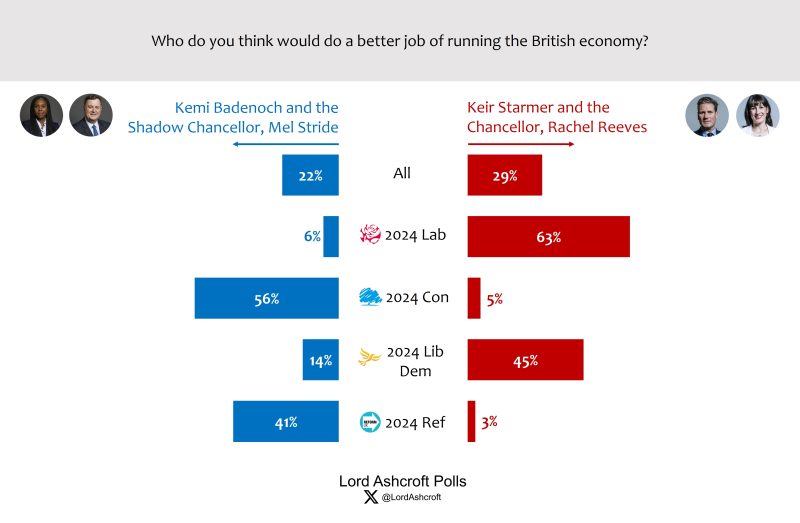
Asked who would do the better job running the economy, voters chose Starmer and Rachel Reeves over Badenoch and Mel Stride by 29% to 22% (down from 30% to 21% last month) with half saying “don’t know”.
The local elections – who will gain (and lose)?
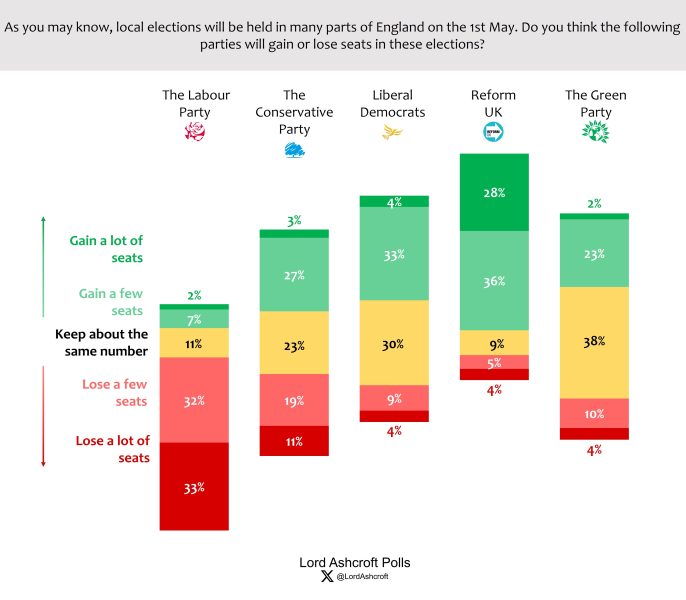
We asked people whether they thought each of the main parties would gain, lose or keep about the same number of seats in the May local elections. The biggest expectation is that Labour will lose seats (65% think so, including 33% that they will lose a lot), and that Reform UK will gain (64% think so, including 28% thinking they will gain a lot). 60% of 2024 Labour voters think their party will lose seats.
The Conservatives were thought as likely to gain seats as lose them (both 30%). 2024 Conservative voters thought the Tories were more likely to gain (51%) than lose (18%). The Greens and Lib Dems are also expected to come out ahead. Reform UK voters were the most confident: 94% expect their party to gain seats at the local elections, including nearly two thirds (64%) who think they will gain a lot.
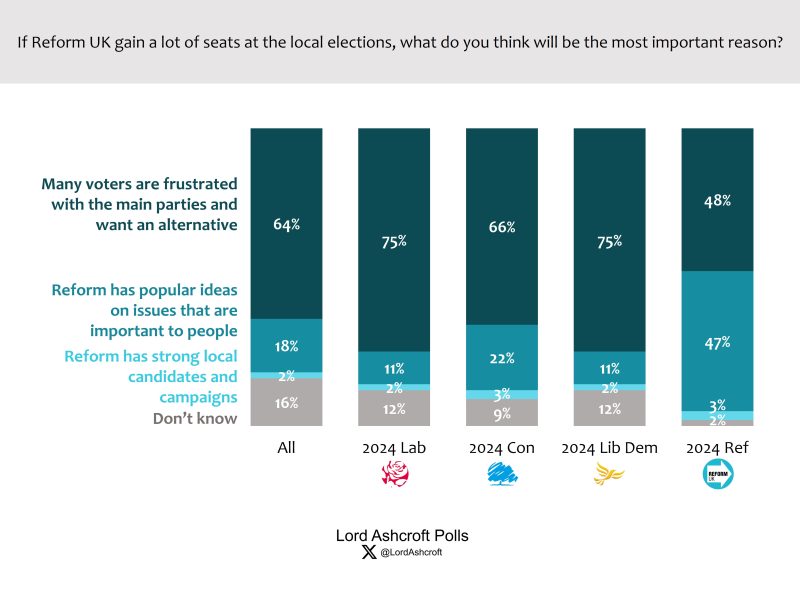
Two thirds, including three quarters of Labour and Lib Dem voters, think Reform gains will be because voters are frustrated with the main parties and want an alternative. Reform UK voters are much more likely than those of other parties to think the explanation would be that their party has popular ideas on issues that are important to people (47%, compared to 18% overall).
The Conservatives and net zero
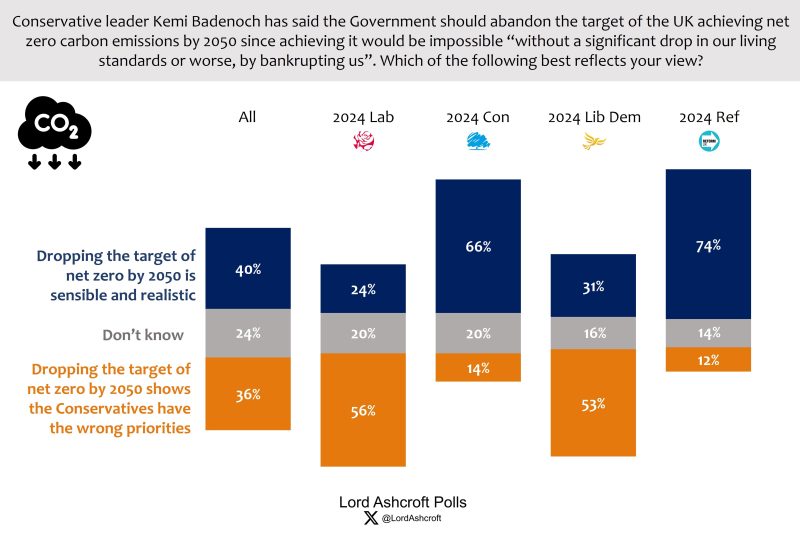
Voters were slightly more likely to think the Conservative policy of dropping the target of net zero by 2050 showed the party was being sensible and realistic (40%) than that it showed the party had the wrong priorities (36%). Two thirds (66%) of 2024 Tories agreed, along with 65% of those who defected from the party at the 2024 election; three quarters (74%) of 2024 Reform UK voters also agreed that dropping the target was sensible and realistic, as did nearly a quarter (24%) of 2024 Labour voters.
The political map

As above, our political map shows how different issues, attributes, personalities and opinions interact with one another. Each point shows where we are most likely to find people with that characteristic or opinion; the closer the plot points are to each other the more closely related they are. Here we see how voters in the less diverse, less secure bottom right are less likely to have a positive view of globalisation – the view that the era is passing and that is a good thing, or that is still with us and that is a bad thing, are both most likely to be found here, as is the view that the way the world is changing brings more threats than opportunities.
The opposite views are most likely to be found in the more prosperous, more diverse top-left quadrant. The better-off, Conservative-leaning top-right quadrant is where we are most likely to find the view that, faced with the choice, the government should cut spending rather than increase taxes or borrowing. This is also where – albeit on the basis of a very small number of responses – we are most likely to find people saying they would like Wes Streeting to be the next Labour leader.
General political
Is Labour bringing change?
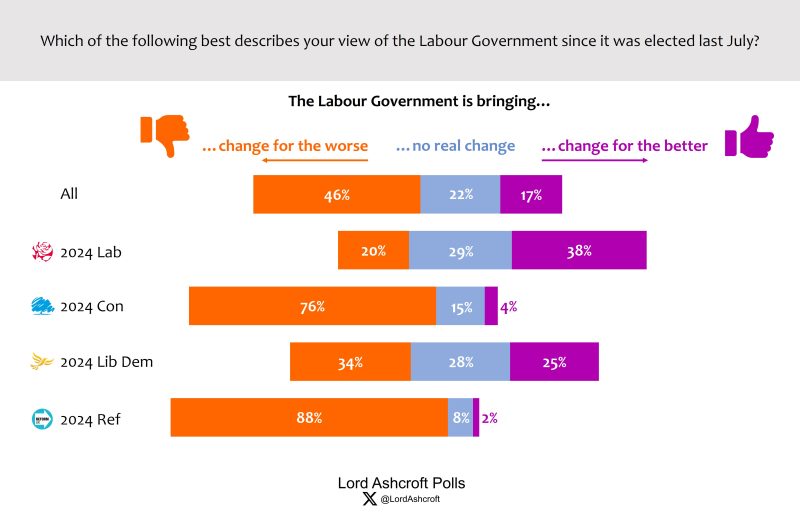
Voters were more likely to think the Labour government was bringing change for the worse (46%) than for the better (17%) or no real change at all (22%). Only 38% of those who voted Labour in 2024 said the government was bringing positive change, with a further 29% saying it was bringing no real change. Those who switched to Labour in 2024 were evenly divided between saying the party was bringing change for the better (29%), for the worse (30%) or no real change (28%). Among those who switched from the Tories to Labour, nearly half (48%) said the government was bringing change for the worse.
Who should be the next Labour leader?
When we asked who people would like to see succeed Keir Starmer as Labour leader, half of all voters (including 41% of 2024 Labour voters) said they didn’t know. Andy Burnham was the most popular choice among the remainder, chosen by 13% overall and by 20% of 2024 Labour voters. He was followed by Angela Rayner (5% overall, 10% of 2024 Labour voters).
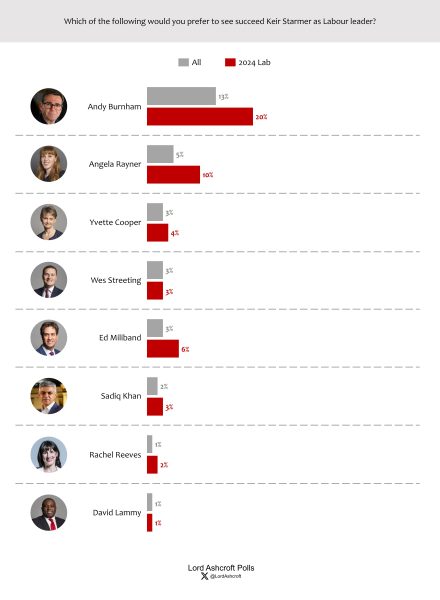
What is driving people?
To help understand what is driving the choice between the two parties, we asked a series of “mini referendum” questions and correlated their answers with their stated likelihood of voting for different parties at the next election.
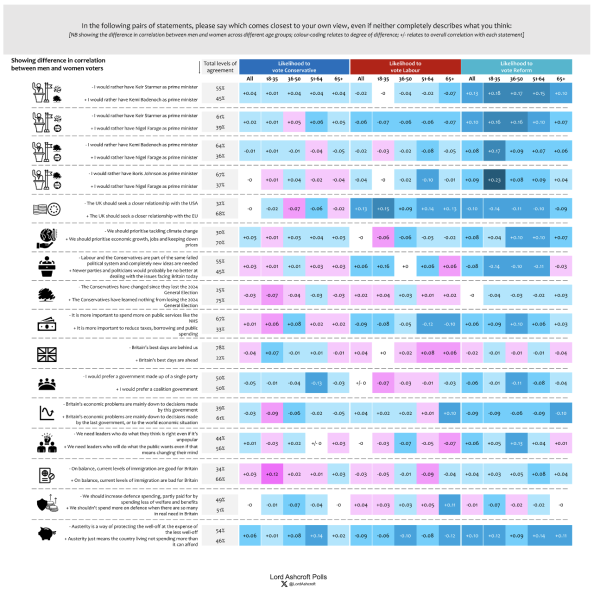
In this analysis we see the effect of each issue when it comes to gender differences by age group. We see that thinking current immigration levels are bad for Britain is a stronger indicator of the likelihood to vote Conservative among young women than among young men, while supporting austerity and single-party government (as opposed to coalition government) is a stronger indicator of Conservative support for late middle-aged men than their female counterparts.
Indicators of Reform support show larger gender divides among 18-35-year-olds: a preference for Nigel Farage as PM, for a closer relationship with the US over the EU and support for austerity being more significant among young men than young women. Anti-Starmer sentiment and support for austerity is a stronger indicator of the likelihood to vote for Reform among men than women across the board.
For Labour, preferring the EU over America is a more significant indicator of support among men than women, even though more women than men support Europe over the US across the board. Among younger male voters, a belief that new parties aren’t the answer is a stronger indicator of support for Labour than for women of an equivalent age. A willingness to prioritise spending increases over tax cuts is a more significant indicator of Labour support among men over 50 than women over 50, and opposition to austerity to cutting benefits to increase defence spending is a more powerful signifier among men over 65 than their female contemporaries.
Best prime minister?
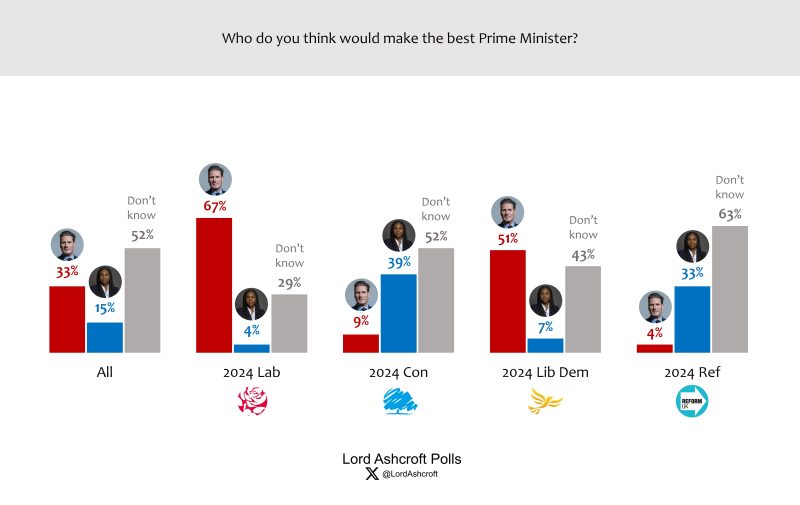
Given a choice between Starmer and Badenoch, voters overall say Starmer would make the best PM by an 18-point margin (33% to 15%, compared t0 20 points in March), though with more than half saying “don’t know”. 67% of 2024 Labour voters say Starmer would make the better PM, while 39% of 2024 Conservatives named Badenoch. Those who voted Reform UK in 2024 said they preferred Badenoch to Starmer by 33% to 4%, with 63% saying “don’t know”.
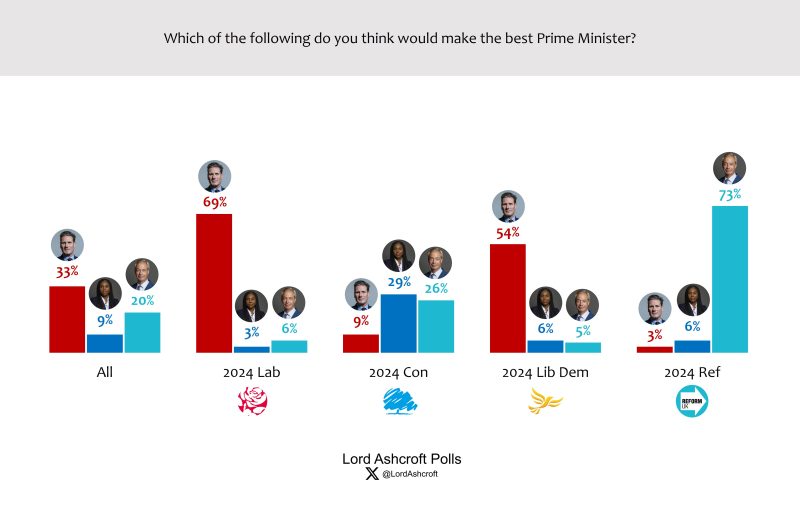
Offered a choice between Starmer, Badenoch and Farage, voters chose Starmer over Farage by 33% to 20% (compared to 35% to 19% last month), with Badenoch in third place on 9%. Among 2024 Conservatives, Badenoch led Farage by 29% to 26%, with 9% choosing Starmer.
The next election
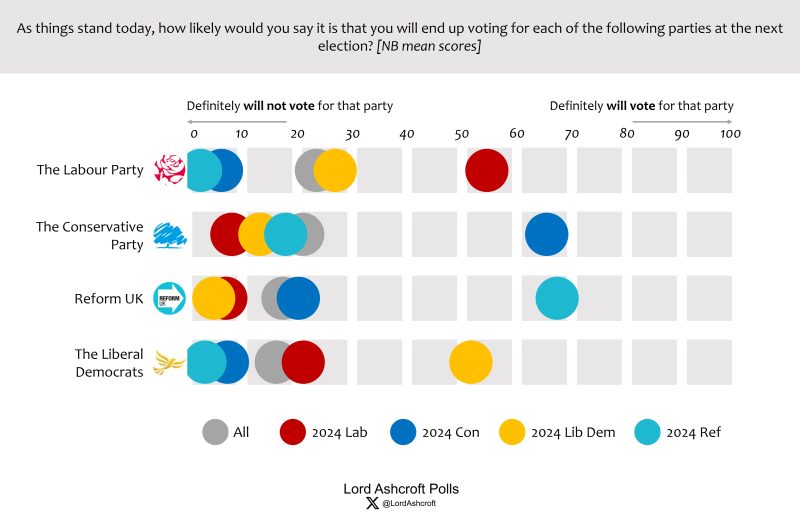
Those who voted Labour in 2024 put their chances of doing so again at the next election at an average of 55/100, compared to 58/100 last month. Those who voted Conservative were more likely to repeat their 2024 vote (65/100, down from 68/100 last month). Those who voted Reform UK put their chances of doing so again at 67/100, compared to 64/100 last month.
Those who switched to Labour in 2024 put their chances of voting for the party again next time at 40/100, down from 45/100 last month. Those who switched from the Conservatives to Labour in 2024 put their chances of voting Labour again next time at an average of 31/100, down from 39/100 in March. Those who switched away from the Conservatives in 2024 currently put their likelihood of returning to the party next time at 25/100 (compared to 24/100 last month).
Looking at those more likely than not to vote for a particular party (those whose highest likelihood of voting for one party was at least 50/100), this implies current vote shares of Labour 27% (-3), Conservative 24 (-), Reform UK 21% (+2), Greens 11% (-), Lib Dems 11% (+1), Others 6% (-).
Full data tables at LordAshcroftPolls.com


![NYC Tourist Helicopter Falls into Hudson River, Siemens Executive and Family Among Those Killed [WATCH]](https://www.right2024.com/wp-content/uploads/2025/04/NYC-Tourist-Helicopter-Falls-into-Hudson-River-Siemens-Executive-and-350x250.jpg)
![Biden Drops Racial Slur During First Public Speech Since Leaving Office [WATCH]](https://www.right2024.com/wp-content/uploads/2025/04/Biden-Drops-Racial-Slur-During-First-Public-Speech-Since-Leaving-350x250.jpg)




![Green Day’s Cringe Trump Diss Ends in Fire and Evacuation [WATCH]](https://www.right2024.com/wp-content/uploads/2025/04/Green-Days-Cringe-Trump-Diss-Ends-in-Fire-and-Evacuation-350x250.jpg)
![Red Sox Fan Makes the ‘Catch of the Day’ with Unconventional ‘Glove’ [WATCH]](https://www.right2024.com/wp-content/uploads/2025/04/Red-Sox-Fan-Makes-the-‘Catch-of-the-Day-with-350x250.jpg)
![Bikini Clad Spring Breakers Prove Our Education System is Failing Students [WATCH]](https://www.right2024.com/wp-content/uploads/2025/03/Bikini-Clad-Spring-Breakers-Prove-Our-Education-System-is-Failing-350x250.jpg)




